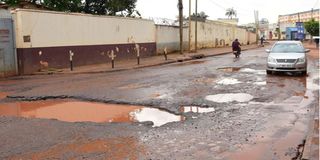It is time to construct Kampala roads

A motorist dodges flooded potholes on Seventh Street in Industrial Area, Kampala on December 22, 2022. PHOTO | FRANK BAGUMA
What you need to know:
- The issue: State of roads
- Our view: The amount of money lost on filling potholes, repairing road surfaces, and doing other maintenance tasks must be decreased. Ugandans deserve better.
Due to heavy rains, a sharper picture of the deplorable condition of the roads in Kampala has become clearer. Ugandans returning from celebrating the Christmas festive season will enter 2023 with the same roads that have been in a very sorry state.
The condition of the city’s road infrastructure is, to put it lightly, very sick.
The city’s road system has become worse as a result of a combination of rising traffic loads and flooding brought on by poor drainage. Due to poor garbage disposal, many drains are clogged, which raises the possibility of flooding during periods of severe precipitation. Additionally, because excavated waste was not removed following utility construction, the drainage problem was exacerbated. Potholes and edge failures are now highly prevalent throughout the city’s road surfaces, which are in a bad shape.
According to Kampala Capital City Authority (KCCA) executive director Ms. Dorothy Kisaka, the city has 2,100km of roads of which 600km are paved or tarmacked and 1,500km are unpaved or gravel.
By her estimation, the authority needs between Shs100b and Shs1 trillion annually to make the roads better.
There is a history of neglecting the infrastructure in the city by the central government and it is our only hope that this will change very soon.
At least 360 km of city roads need to be reconstructed because their service life has expired but KCCA says in the coming weeks, work on about 70kms will commence.
This is a welcome development but as recent experience shows, the promise of a few weeks can turn into years.
The roads include Wamala and Luwafu in Rubaga, Kabega, and Kayemba in Makindye, Eighth Street in Central, and Portbell Road in Nakawa.
Our call is that the promised 70kms face no further delays. We hope that KCCA impresses upon its contractors to work per the set timelines and deliver quality work to form the basis for the demand for more resources but also as a benchmark for other works.
We do not envisage, as has happened in the past, a situation where constructing less than 3km of road takes more than five years amid costly delays to the taxpayer.
We also hope that there will be a proper widening of the roads and that drainage systems will be worked on.
Everyone who travels on Kampala’s roadways has experienced the negative effects of the poor roads.
Traffic congestion costs money, as do vehicle and motorcycle upkeep, lost productivity from travel time, and traffic delays.




